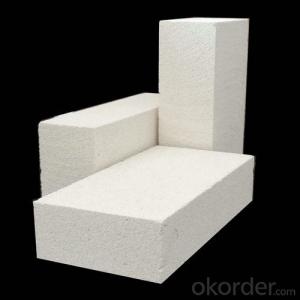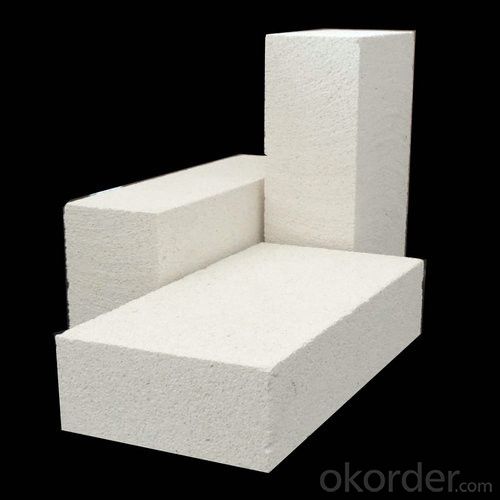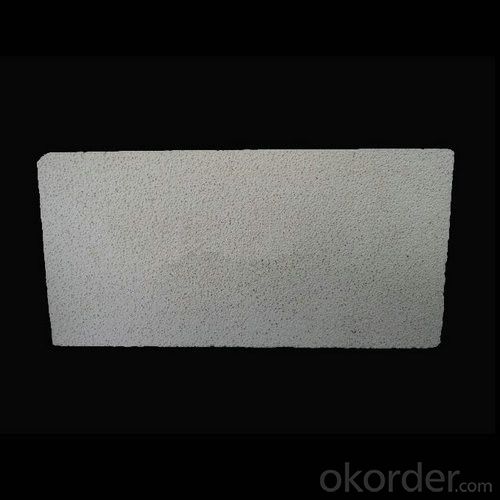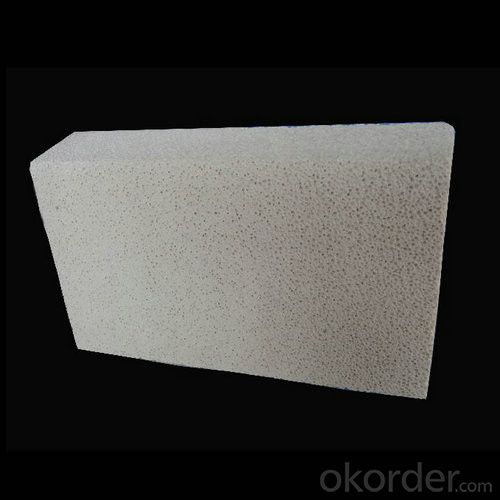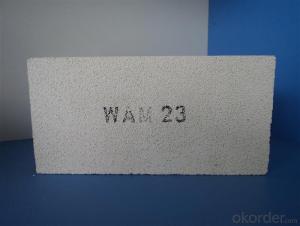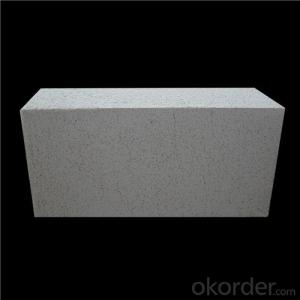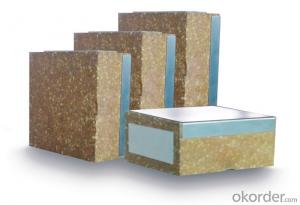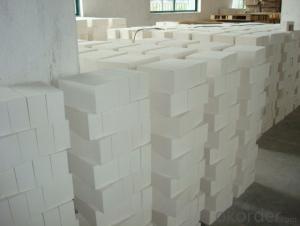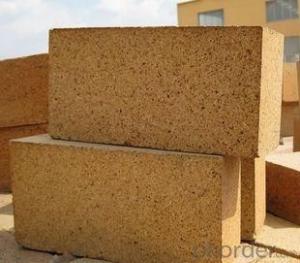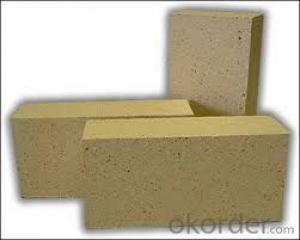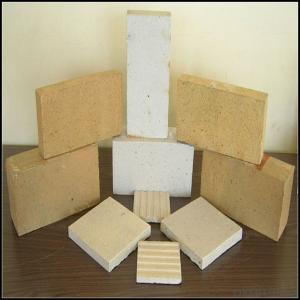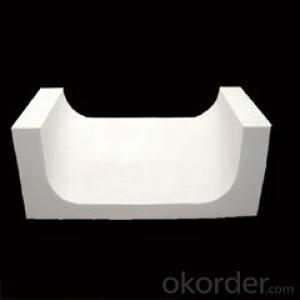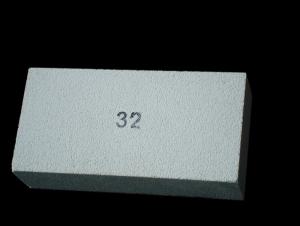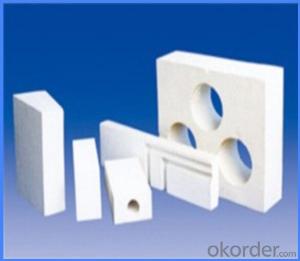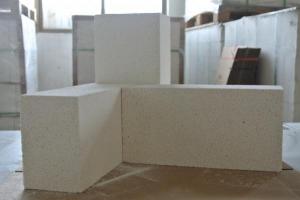Insulating Fire Brick - High Alumina Insulating Firebrick for Sale
- Loading Port:
- Shanghai
- Payment Terms:
- TT OR LC
- Min Order Qty:
- 1 m.t.
- Supply Capability:
- 1000000 m.t./month
OKorder Service Pledge
OKorder Financial Service
You Might Also Like
Features:This product used super alumina as mainly raw material,adopted the burning weight-loss method to produce
with proper admixture.
Application:Widely used in metallurgy,machinery,ceramic,chemical industry and various furnace lining(Don't suffer the meltwater eroding),and it is an ideal energy-saving product.Using temperature below 1400°C.
Item | Properties | ||||
LTL-0.6 | LTL-0.8 | LTL-1.0 | LTL-1.2 | ||
Bulk density,g/cm3 | 0.6 | 0.8 | 1.0 | 1.2 | |
Cold Crushing strength MPa | 2.0 | 3.98 | 4.98 | 5.98 | |
Permanent linear change,2%(°C×h) | 1350×12 | 1400×12 | 1400×12 | 1400×12 | |
Coefficient of thermal conductivity w/m.k(350±25°C) | 0.25 | 0.29 | 0.35 | 0.45 | |
Fe2O3% | 1.8 | 1.8 | 1.8 | 1.8 | |
AL2O3% | 50 | 50 | 55 | 55 | |
Application | All industrial furnace | ||||
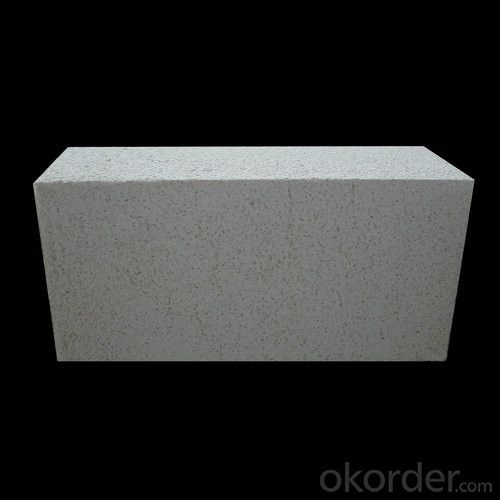
Application of Insulating Firebricks
CMAX insulating firebricks can be used as a hot face lining directly exposed to the heat or as a backup insulation layer in iron and steel mills, non-ferrous foundries, petrochemical, ceramic, glass.
FAQ
Q1: How do you control the products quality?
A1: With strict quality control system throughout the materials selection and production process, our refractory and ceramic fiber products quality is effectively controlled to meet customer requirements.
From the raw materials selecting, our quality control begin. The quality certificates of raw materials are required and each batch will be tested before using. During production, the quality control are conducted by workers and then each piece will be sorted and examined by quality supervis
Q2: What`s the lead time for my order?
A2: It depends on customers’ requirements and our production schedule. And usually we need 30-60 days for refractory bricks,10-25 days for unshaped refractory materials and 10-20 days for ceramic fiber blankets.
- Q: How do insulating fire bricks provide thermal insulation?
- Insulating fire bricks provide thermal insulation due to their low thermal conductivity and high porosity. The bricks are made from lightweight materials such as clay, alumina, or silica, which have low thermal conductivity. The high porosity of these bricks allows for the trapping of air or gas bubbles within their structure, which further reduces heat transfer. As a result, insulating fire bricks effectively minimize the conduction of heat, making them ideal for applications that require thermal insulation.
- Q: Are insulating fire bricks resistant to fluorine gas?
- Typically, insulating fire bricks do not possess resistance against fluorine gas. Known for its high reactivity and corrosiveness, fluorine gas has the capability to react with diverse substances, including insulating fire bricks. The corrosive properties of fluorine gas may result in structural and integrity harm to the fire bricks, eventually leading to their degradation or malfunction. Hence, it is recommended to opt for an alternative refractory material that is specifically engineered to endure the corrosive impact of fluorine gas, in case it is needed for a specific application.
- Q: Can insulating fire bricks be used in the construction of lime calciners?
- Yes, insulating fire bricks can be used in the construction of lime calciners. Lime calciners require high temperatures to produce lime, and insulating fire bricks are designed to withstand and retain heat. These bricks have low thermal conductivity, allowing them to effectively insulate the calciner and prevent heat loss. Additionally, insulating fire bricks are lightweight, making them easier to handle and install in the construction of lime calciners.
- Q: Can insulating fire bricks be used in biomass boilers?
- Indeed, insulating fire bricks are applicable in biomass boilers. These bricks are specifically engineered to possess minimal thermal conductivity, thereby aiding in the preservation of heat within the boiler and augmenting its overall efficiency. When employed in biomass boilers, these bricks function as linings for the combustion chamber, effectively confining the heat and preventing its dissipation. Moreover, insulating fire bricks exhibit exceptional resistance to elevated temperatures, rendering them suitable for use in biomass boilers where combustion temperatures can soar to several hundred degrees Celsius. Ultimately, the utilization of insulating fire bricks in biomass boilers serves to heighten their thermal efficiency, thereby lending support to a more proficient and sustainable energy production process.
- Q: Can insulating fire bricks be used for insulation in hot blast stoves?
- Yes, insulating fire bricks can be used for insulation in hot blast stoves. Insulating fire bricks are designed to withstand high temperatures and have excellent thermal insulation properties. They are made from lightweight materials with low thermal conductivity, which allows them to effectively retain heat and prevent heat transfer to the surrounding environment. In hot blast stoves, where temperatures can reach extremely high levels, insulating fire bricks can help maintain high temperatures inside the stove while minimizing heat loss. This not only improves the energy efficiency of the stove but also helps to protect the structure from excessive heat. Therefore, using insulating fire bricks for insulation in hot blast stoves is a common and effective practice.
- Q: Can insulating fire bricks be used in the construction of refractory coatings?
- Indeed, refractory coatings can utilize insulating fire bricks during their construction. The purpose of insulating fire bricks is to possess a low thermal conductivity, enabling them to effectively hinder the transfer of heat. Consequently, they prove to be an optimal choice for refractory coatings, which serve the purpose of shielding structures from elevated temperatures. Refractory coatings are applied onto surfaces that endure extreme heat, such as furnaces, kilns, and chimneys. These coatings furnish an insulating layer that aids in preserving heat, preventing harm to the underlying structure, and enhancing energy efficiency. In the construction of refractory coatings, insulating fire bricks can be employed as a foundational layer. They can be stacked and bonded together to form a sturdy and heat-resistant surface. This layer acts as a barrier that impedes the passage of heat to the underlying structure. Apart from their low thermal conductivity, insulating fire bricks possess other attributes that render them suitable for use in refractory coatings. They exhibit high temperature resistance, enabling them to withstand the intense heat generated in industrial applications. Furthermore, they boast a lightweight nature and are easy to handle, facilitating convenient installation and handling. To summarize, insulating fire bricks present themselves as a dependable choice when it comes to constructing refractory coatings. With their exceptional insulation properties and capacity to shield against high temperatures, they stand as a valuable component in the production of structures that can withstand extreme heat.
- Q: Can insulating fire bricks be used in cement kilns?
- Indeed, in cement kilns, insulating fire bricks find their utility. These bricks are specifically engineered with a low thermal conductivity, rendering them an excellent choice for insulating environments that endure high temperatures, like cement kilns. By employing these bricks, heat loss can be minimized, thereby enhancing energy efficiency within the kiln. Furthermore, their lightweight composition facilitates ease of handling and installation in the kiln. Nevertheless, it is crucial to carefully select insulating fire bricks that align with the unique operating conditions and demands of the cement kiln to guarantee utmost performance and durability.
- Q: How do insulating fire bricks affect the overall indoor air quality of a building?
- Insulating fire bricks have a positive impact on the overall indoor air quality of a building. These bricks are designed to resist high temperatures and prevent heat transfer, which helps in maintaining a comfortable and consistent indoor temperature. By improving thermal insulation, they reduce the need for excessive use of heating and cooling systems, thereby minimizing the release of pollutants and improving energy efficiency. Additionally, insulating fire bricks are non-combustible, meaning they do not emit harmful gases or particulate matter when exposed to heat. This further contributes to a healthier indoor environment by reducing the potential for air pollution and respiratory issues.
- Q: Are insulating fire bricks suitable for outdoor use?
- Insulating fire bricks are not typically suitable for outdoor use due to their lower density and higher porosity compared to other types of bricks. These bricks are designed for use in high-temperature applications such as furnaces and kilns, where they provide excellent insulation properties. However, when exposed to the elements, insulating fire bricks may absorb moisture and be prone to cracking or deteriorating over time. For outdoor applications, it is generally recommended to use dense fire bricks or other types of bricks that are specifically designed for outdoor use, as they have greater durability and resistance to weather conditions.
- Q: What temperature can insulating fire bricks withstand?
- Insulating fire bricks are capable of withstanding high temperatures, typically ranging from 2,200 to 3,000 degrees Fahrenheit (1,200 to 1,650 degrees Celsius). These bricks are specifically designed to provide excellent thermal insulation and retain their structural integrity even under extreme heat conditions. The ability to withstand such high temperatures makes insulating fire bricks ideal for various applications, including furnaces, kilns, fireplaces, and other high-temperature environments.
Send your message to us
Insulating Fire Brick - High Alumina Insulating Firebrick for Sale
- Loading Port:
- Shanghai
- Payment Terms:
- TT OR LC
- Min Order Qty:
- 1 m.t.
- Supply Capability:
- 1000000 m.t./month
OKorder Service Pledge
OKorder Financial Service
Similar products
Hot products
Hot Searches
Related keywords
